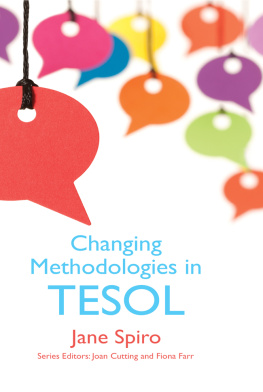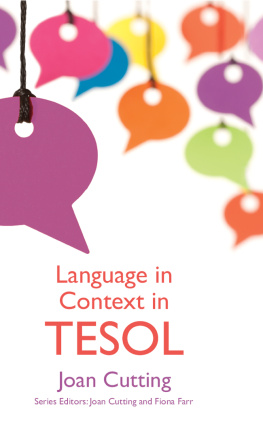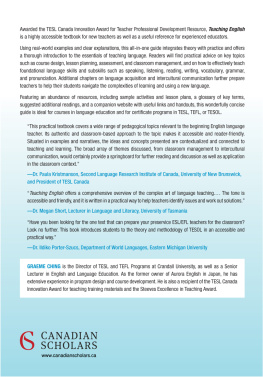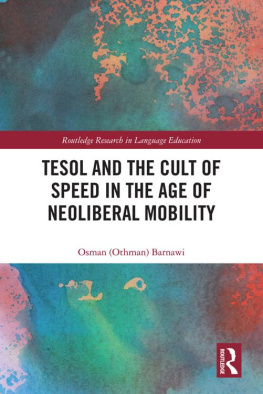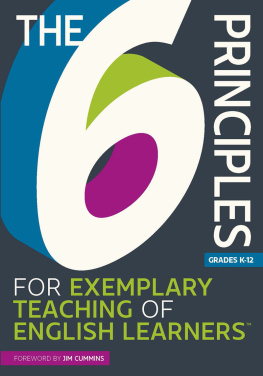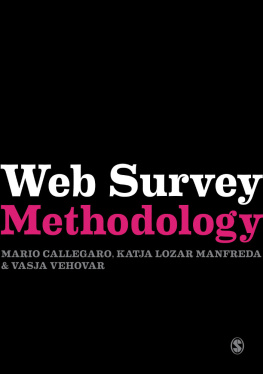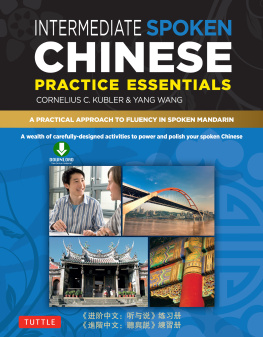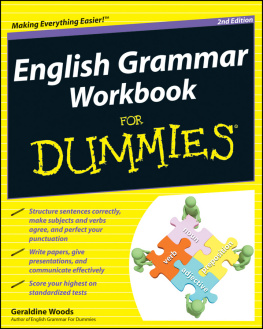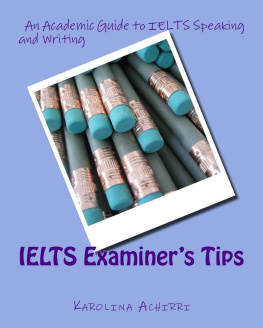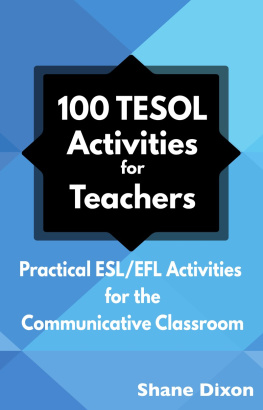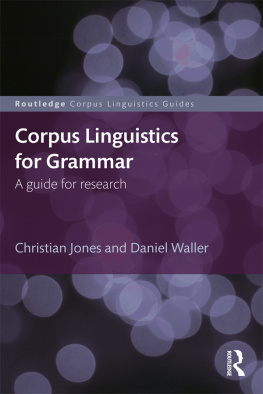Changing Methodologies in
TESOL
Jane Spiro
the chapter their several authors, 2013
Edinburgh University Press Ltd
22 George Square, Edinburgh EH8 9LF
www.euppublishing.com
Typeset in 10/12 Minionby
Servis Filmsetting Ltd, Stockport, Cheshire,
and printed and bound in Great Britain by
CPI Group (UK) Ltd, Croydon CR0 4YY
A CIP record for this book is available from the British Library
ISBN 978 0 7486 4620 3 (hardback)
ISBN 978 0 7486 4619 7 (paperback)
ISBN 978 0 7486 7762 7 (webready PDF)
ISBN 978 0 7486 7764 1 (epub)
The right of the contributors
to be identified as author of this work
has been asserted in accordance with
the Copyright, Designs and Patents Act 1988.
USEFUL ABBREVIATIONS
BANA | British, Australasian, North American (Holliday 1995) |
BNC | British National Corpus |
BAWE | British Academic Writing in English Corpus |
CANCODE | Cambridge-Nottingham Corpus of Discourse in English |
CLIL | content and language integrated learning |
CLL | Community language learning (Curran 1983) |
CLT | Communicative language teaching |
EAP | English for Academic Purposes |
EIL | English as an International Language |
ELF | English as a Lingua Franca |
ELT | English Language Teaching |
ENL | English as a Native Language |
ESP | English for Specific Purposes |
HOT | Higher order thinking |
ICT | Information communication technology |
LAB | Language Aptitude Battery (Pimsleur 1966) |
LAD | Language Acquisition Device (Chomsky 1965) |
LL | language learning |
LT | language teaching |
MLAT | Modern Languages Aptitude Test (Carroll and Sapon 1955) |
PPP | Presentation Practice Performance |
SLA | Second Language Acquisition |
TBL | Task-based learning (Ellis 2003; Eckerth and Siekman 2008) |
TESEP | Tertiary, Secondary and Primary (Holliday 1995) |
TPR | Total Physical Response (Asher, Kusudo and de la Torre 1983) |
TEACHING CASE STUDIES
Australia (Case Study 18, )
Bangladesh (Task 94)
Brazil (, Further reading 1)
Canada (Case Study 11, )
Cambodia (Case Study 22, )
Cameroon (Case Study 21, )
China (Case Study 14, )
Congo (Case Study 20, )
Czech Republic (Case Study 12, )
France (Case Study 19, )
Hong Kong (Case Study 13, )
Hungary (Case Study 8, )
India (Case Study 7, )
Indonesia (Case Study 16, )
Iran (pp. 2067)
Japan (Case Study 4, )
Kuwait (Case Study 2, )
Mexico (Case Study 3, )
New Zealand (Case Study 24, )
Romania (Case Study 1, )
South Africa (, online task 3.11)
South Korea (Case Study 9, )
Sri Lanka (Case Study 10, )
Tai Wan (online task 8.3)
Thailand (Case Study 23, )
United Kingdom (Case Study 5, )
United States (, Further reading 1)
SERIES EDITORS PREFACE
Editors Joan Cutting, University of Edinburgh and Fiona Farr, University of Limerick
This series of textbooks addresses a range of topics taught within TESOL programmes around the world. Each volume is designed to match a taught core or option course (identified by a survey of TESOL programmes worldwide) and could be adopted as a prescribed text. Other series and books have been aimed at Applied Linguistics students or language teachers in general, but this aims more specifically at students of ELT (English Language Teaching the process of enabling the learning of English), with or without teaching experience.
The series is intended primarily for college and university students at third or fourth year undergraduate level, and graduates (pre-service or in-service) studying TESOL on Masters programmes and possibly some TESOL EdDs or Structured PhDs, all of whom need an introduction to the topics for their taught courses. It is also very suitable for new professionals and people starting out on a PhD, who could use the volumes for self-study. The readership level is introductory and the tone and approach of the volumes will appeal to both undergraduates and postgraduates.
This series answers a need for volumes with a special focus on intercultural awareness. It is aimed at programmes in countries where English is not the mother tongue, and in English-speaking countries where the majority of students come from countries where English is not the mother tongue, typical of TESOL programmes in the UK and Ireland, Canada and the US, Australia and New Zealand. This means that it takes into account physical and economic conditions in ELT classrooms round the world and a variety of socio-educational backgrounds. Each volume contains a number of tasks which include examples from classrooms around the world, encourage comparisons across cultures and address issues that apply to each student's home context. Closely related to the intercultural awareness focus is a minor theme that runs throughout the series, and that is language analysis and description, and its applications to ELT. Intercultural awareness is indeed a complex concept and we aim to address it in a number of different ways. Taking examples from different cultural contexts is one, but we also plan to look at many other educationally relevant cultural dimensions such as sociolinguistic influences, gender issues, various learning traditions (e.g. collectivist vs individualistic), culturally determined language dimensions (e.g. politeness conventions). Taking examples from different cultural contexts is one way of tackling the issue of intercultural awareness, but the volumes in the series also look at many other educationally relevant cultural dimensions such as sociolinguistic influences, gender issues, various learning traditions (e.g. collectivist vs individualistic), culturally determined language dimensions (e.g. politeness conventions).
TESOL students need theory clearly related to practice. This series is practical and is intended to be used in TESOL lectures and workshops, providing group tasks and independent activities. Students are invited to engage in critical thinking and to consider applications of concepts and issues to their own particular teaching contexts, adapting the tendencies and suggestions in the literature to their own countries educational requirements. Each volume contains practical tasks to carry out individually, in small groups or in plenary in the classroom, as well as suggestions for practical tasks for the students to use in their own classrooms. All the concepts and issue encountered here will be translatable into the ELT classroom. It is hoped that this series will contribute to your improvement as a teacher.
The series presents ELT concepts and research issues simply. The volumes guide students from the basic concepts, through the issues and complexities, to a level that should make them alert to past and recent teaching and research developments in each field. This series makes the topics accessible to those unaccustomed to reading theoretical literature, and yet takes them to an exam and Master's standard, serving as a gateway into the various fields and an introduction to the more theoretical literature. We also acknowledge that

